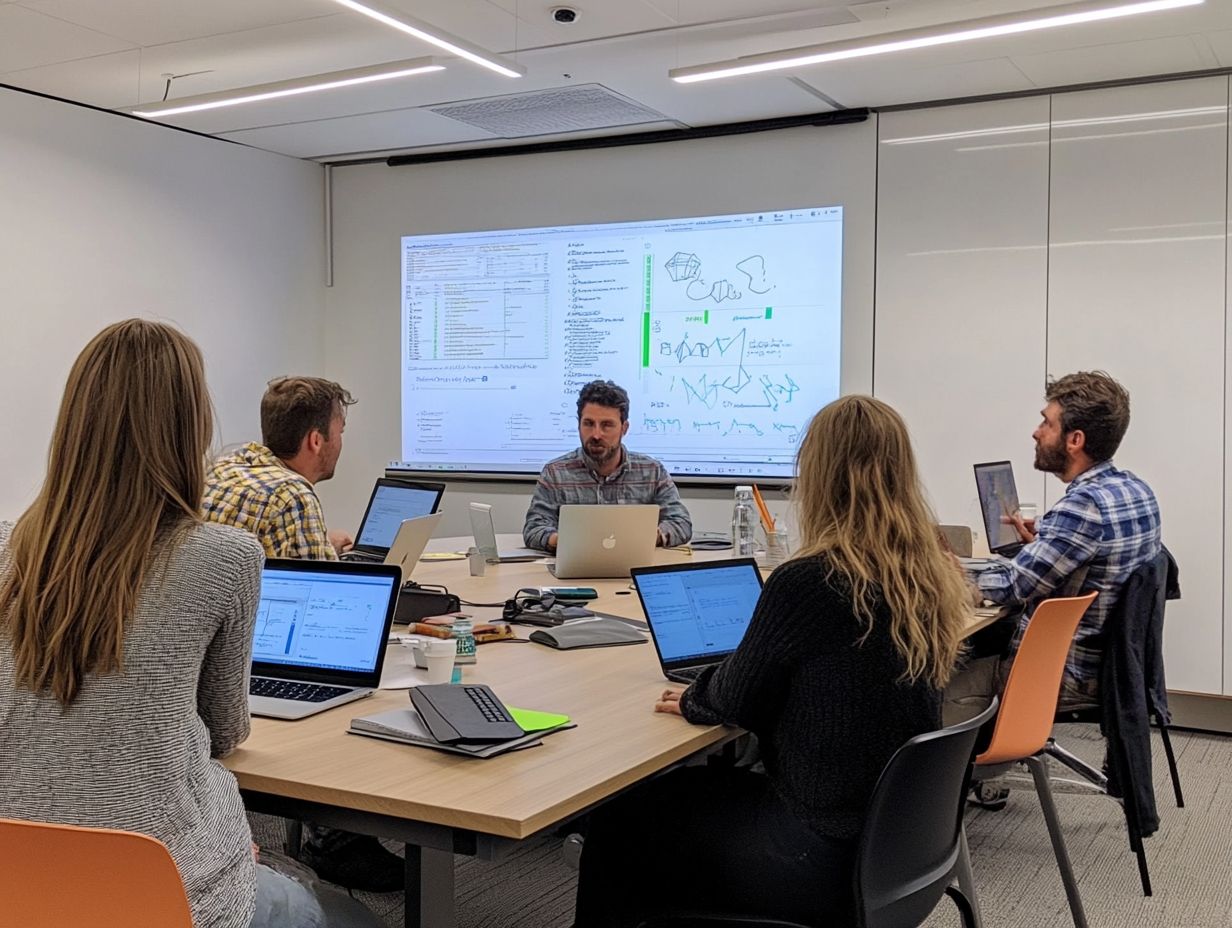Project Management Certification for Beginners
In today s fast-paced business landscape, obtaining a project management certification is a savvy move for professionals eager to elevate their skills and boost their careers.
This article delves into the essentials of project management certification, highlighting the many benefits and advantages it offers for career advancement. It also outlines the steps necessary to obtain and maintain your certification, ensuring you re thoroughly prepared to thrive in this dynamic field.
Contents
- Key Takeaways:
- Benefits of Obtaining Project Management Certification
- Types of Project Management Certifications
- How to Choose the Right Project Management Certification
- Steps to Obtain Project Management Certification
- Application Process and Exam Preparation
- Maintaining Project Management Certification
- Frequently Asked Questions
- What is a project management certification for beginners?
- Why should I consider getting a project management certification as a beginner?
- What are the different types of project management certifications for beginners?
- What are the benefits of earning a project management certification for beginners?
- What are the eligibility requirements for a project management certification for beginners?
- How can I prepare for a project management certification exam as a beginner?
Key Takeaways:

Obtaining a project management certification can provide numerous benefits to your career and professional development. With a variety of project management certifications available, it is important to carefully consider your options and choose the right one based on your goals and industry. To maintain your project management certification, you will need to fulfill ongoing training requirements and regularly renew your certification.
What is Project Management Certification?
Project Management Certification is a formal credential that showcases your expertise and proficiency in project management concepts, methodologies, and practices. This includes the highly regarded PMP (Project Management Professional) and CAPM (Certified Associate in Project Management) certifications offered by the Project Management Institute (PMI).
These certifications validate your skills in project risk management, communication management, and scheduling key elements for successfully leading projects across various industries, from technology to construction.
In today’s competitive job market, securing project management certification can dramatically boost your career right now! The PMP certification, aimed at seasoned professionals, demands a robust understanding of the project life cycle coupled with practical experience, making it the gold standard in the field.
On the other hand, the CAPM serves as an excellent entry-level qualification for those embarking on their project management journey, providing a solid foundation to build upon.
Both certifications play a crucial role in developing your project management skills and often require ongoing education units for maintenance. This ensures you remain updated with industry trends and methodologies, which are essential for effective project oversight.
Benefits of Obtaining Project Management Certification
Obtaining project management certification unlocks a wealth of benefits that can significantly elevate your career trajectory. It enhances your job marketability and can pave the way for higher salaries.
Credentials such as the PMP and CAPM certifications have become highly coveted in today s competitive job landscape, positioning you as a prime candidate for advancement and success.
Advantages in Career and Professional Development
The advantages of obtaining project management certification go far beyond just adding a shiny credential to your resume. They play a crucial role in your career advancement and professional development.
By equipping you with essential skills, these certifications make you significantly more attractive to potential employers scanning job postings. These credentials can skyrocket your earning potential!
Employers are often eager to hire certified professionals, as they are perceived to be more competent and better prepared to handle complex projects efficiently.
As you acquire these credentials, you ll enhance critical project management skills like risk assessment and stakeholder engagement, which ultimately leads to successful project outcomes.
Engaging in ongoing professional development through specialized courses, workshops, and PMI certifications can be instrumental for your career growth, ensuring you remain at the forefront of industry advancements and maintain your competitive edge.
Are you ready to take your career to the next level with project management certification?
Types of Project Management Certifications

You have a variety of project management certifications at your fingertips, each designed to suit different levels of experience and methodologies in the field.
Among these are the:
- PMP (Project Management Professional), which is highly regarded,
- CAPM (Certified Associate in Project Management) for those just starting out,
- Agile certifications,
- Scrum Master certification.
Each option offers a unique pathway to enhance your skills and advance your career in project management.
Overview and Comparison of Different Certifications
When you’re considering project management certifications, it’s crucial to understand the differences and benefits of each option. Think about the PMP and CAPM from PMI, Agile methodology certifications, and the Scrum Master certification. Each one caters to distinct project management philosophies and practices.
Understanding the frameworks and methodologies behind these certifications will greatly enhance your project management skills. The PMP, for instance, focuses on a traditional, structured approach, making it perfect for those who thrive on detailed planning and processes.
On the flip side, Agile certifications emphasize adaptability and iterative progress, aligning seamlessly with today s fast-paced business environment.
If you re aiming for the Scrum Master certification, be prepared to help teams work together and adopt agile practices effectively. Recognizing these nuances will help you select the right certification based on your career goals, the types of projects you want to tackle, and the needs of your organization ultimately positioning you for success in the ever-evolving landscape of project management.
How to Choose the Right Project Management Certification
Selecting the appropriate project management certification requires a thoughtful evaluation of your personal career aspirations, existing skill set, and the specific project management methodologies you intend to embrace.
Whether you lean towards PMP for traditional frameworks or Agile certifications for more adaptive project environments, making an informed choice will set the foundation for your professional growth.
Factors to Consider and Resources for Research
When you re contemplating a project management certification, there are several key factors to weigh. Start by considering your existing qualifications, the time and financial investment needed, and how well the certification aligns with your career objectives.
It s also wise to research reputable sources like PMI and esteemed project management training academies.
Evaluating your budget is essential, as the costs associated with certification can vary widely depending on the program you choose. Think about the time commitment required for studying and completing exams; make sure you can fit this study time into your work and personal life.
It s crucial to assess how your chosen certification will enhance your qualifications and relevance in the job market. By browsing job postings for certified project managers, you can uncover the skills and certifications that employers truly prioritize.
Don t forget to explore training resources, such as online courses, workshops, and study groups, to develop a comprehensive preparation strategy that sets you up for success.
Steps to Obtain Project Management Certification

The journey to obtaining your project management certification usually begins with evaluating your eligibility. Once you’ve established that you meet the criteria, you’ll want to prepare for the certification exam by enrolling in structured training courses designed to enhance your knowledge and skills.
Finally, you’ll complete the application process as outlined by the certifying body, such as PMI for PMP and CAPM certifications. This plan will guide you to success in your project management career!
Don t wait! Start on your path to certification today!
Application Process and Exam Preparation
The application process for project management certification can vary depending on the certifying authority. Typically, it involves submitting details about your education and professional experience, followed by intense exam preparation especially if you re aiming for established certifications like the PMP from PMI.
For the Project Management Professional (PMP) certification, you need to meet specific eligibility criteria. This includes a blend of educational qualifications and project management experience. Thorough documentation is key; you’ll have to provide proof of your educational background, detailing the hours you’ve spent leading projects and any relevant training.
The Certified Associate in Project Management (CAPM) offers a more accessible entry point, requiring just a secondary degree and 23 hours of project management education.
To boost your chances of success, seek out comprehensive study guides, practice exams, and online training resources. This ensures you re thoroughly prepared for the challenges that lie ahead in the exam.
Maintaining Project Management Certification
To maintain your project management certification, you need to commit to ongoing education and meet the renewal requirements established by the certifying body.
This often involves accumulating professional development units (PDUs) units earned through training and education activities for your PMP certification. This can be achieved through various training sessions and learning experiences tailored to project management.
Staying engaged in these activities keeps your certification current and enhances your skills and knowledge in the field.
Continuing Education and Renewal Requirements
Continuing education and fulfilling renewal requirements are essential for maintaining your project management certification. Committing to ongoing education keeps you on top of your game!
To renew your certification, you ll usually need to accumulate a specific number of PDUs within a designated timeframe, often three years. You can obtain these PDUs through a range of activities, including formal training sessions, workshops, or seminars, as well as self-directed learning and volunteering in the field.
Acceptable formats for continuing education can vary but may include online courses, webinars, and conferences specifically focused on project management. To make this process smoother, tap into resources such as online platforms, professional organizations, and local chapters that offer curated listings of training opportunities tailored to your developmental needs.
Frequently Asked Questions

What is a project management certification for beginners?
A project management certification for beginners is a professional qualification designed to provide individuals with the basic knowledge and skills needed to successfully manage projects. To learn more about this, check out our guide on understanding project management certifications.
Why should I consider getting a project management certification as a beginner?
Getting a project management certification as a beginner can greatly enhance your career prospects and help you stand out in a competitive job market. It also provides you with the essential skills and knowledge to manage projects effectively. For more insights, check out the role of certification in project management career to understand its impact on your professional journey.
What are the different types of project management certifications for beginners?
Several types of project management certifications are available for beginners, such as the Certified Associate in Project Management (CAPM), Project Management Professional (PMP), and Certified Project Manager (CPM). To enhance your skills, exploring the top project management tools for certified professionals can be beneficial. Each certification has its own requirements and focuses on different aspects of project management.
What are the benefits of earning a project management certification for beginners?
Earning a project management certification for beginners can open up new career opportunities and increase your earning potential. It also helps dispel common misconceptions about the field, as detailed in project management certification myths and facts, demonstrating your commitment to the field and mastery of project management principles and techniques.
What are the eligibility requirements for a project management certification for beginners?
The eligibility requirements for a project management certification for beginners vary depending on the specific certification. Generally, you will need to have a high school diploma or equivalent. Some certifications may also require a certain number of hours of project management education or experience, so it’s important to consider the future of project management certifications when planning your path.
How can I prepare for a project management certification exam as a beginner?
Start today by signing up for a course or studying on your own with online resources and guides. Gaining practical experience by working on small projects will help you learn faster.
Practice with sample exam questions to boost your confidence. Remember, every bit of preparation counts!





